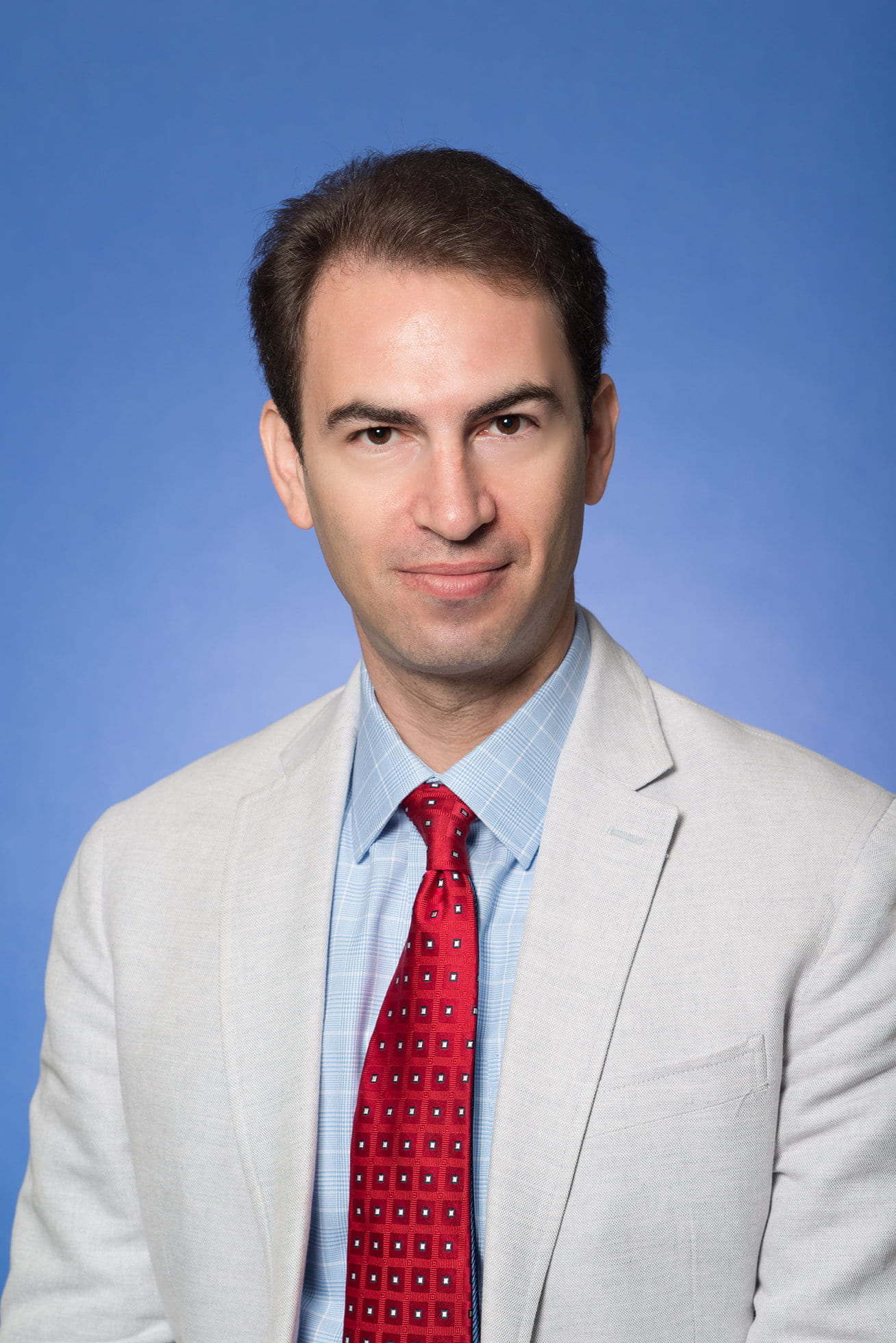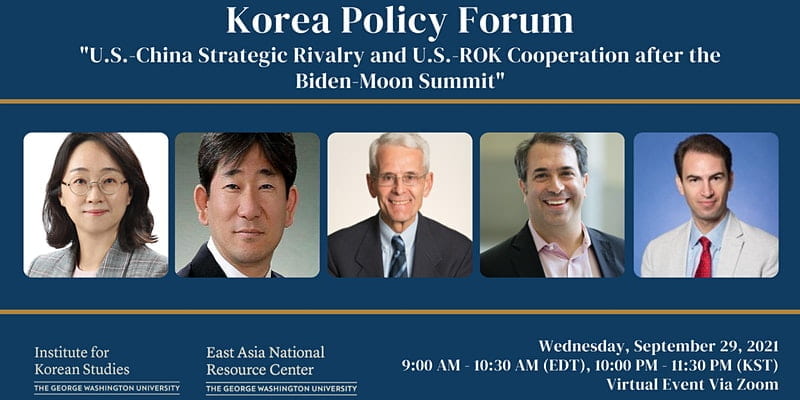Korea Policy Forum Virtual Roundtable
U.S.-China Strategic Rivalry and U.S.-ROK Cooperation After the Biden-Moon Summit
Wednesday, September 29, 2021
9:00 AM – 10:30 AM EDT
Zoom Event
In their first summit meeting held last May, South Korean President Moon Jae-in and U.S. President Joe Biden rejuvenated the decades-long alliance by not only focusing on traditional bilateral topics but also addressing new regional and global issues in the context of the intensifying U.S.-China strategic rivalry—including climate change, supply chains, and freedom of navigation in the South China Sea. The agreements made at the summit could have long-term ramifications for South Korea’s strategic positioning in Northeast Asia and the United States’ broader regional strategy. In particular, the allies will have to navigate changing dynamics in domestic politics leading up to and after the 2022 presidential election in South Korea and midterm elections in the United States. Please join the GW Institute for Korean Studies for an online discussion with experts who will be discussing views from the United States and South Korea on the presently evolving chapter in U.S.-ROK relations following the May summit.
This event is on the record and open to the public.
Speakers

Hyo-young Lee is currently Assistant Professor at the Korea National Diplomatic Academy (KNDA), teaching International Trade & Diplomacy. Before joining the KNDA faculty in March 2017, she worked as a research fellow at the Korea Institute for International Economic Policy (KIEP) Division of International Trade (2013-2016), during which she also worked as Assistant Secretary for Trade, Industry and Energy at the Presidential Office (2014-2015). Her research interest spans over various issues in international trade, with particular interest in trade rules on industrial subsidy policies, digital trade, and various issues that are linked with trade, such as trade and national security, trade and climate change. She has written on various subjects, with recent reports on: Evolution and Evaluation of International Rules on Digital Trade (2021), Current Trends and Prospects for Asia Regional Economic Integration: RCEP and CPTPP (2021), Concept of ‘Peace and Economic Development’ in Multilateral Institutions and Implications for Inter-Korean Cooperation (2020), Regulation of Subsidies and U.S.-China Strategic Competition (2020), Trade and Development: Way Forward for Economic and Trade Cooperation with Developing Countries (2019), and Rise of Regionalism and Tasks for South Korea’s Trade Diplomacy (2019). Dr. Lee obtained her Ph.D. in International Studies from Seoul National University, South Korea.

Hyun-Wook Kim is currently a Professor and Director-General at the Korea National Diplomatic Academy. His research areas include the U.S.-ROK alliance, U.S-DPRK relations and Northeast Asian security. He was an advisory member for the National Security Council and the Ministry of Unification, and is now a standing member for the National Unification Advisory Council. He is also a senior advisor for the Joint Chiefs of Staff, and is also an honorary research fellow at the Korean Naval Academy. He was a visiting scholar at UC San Diego in 2014 and at George Washington University in 2020-21. He has earned his Ph.D. and M.A. in political science from Brown University, and worked at the University of Southern California as a postdoctoral fellow. He received his B.A. in political science from Yonsei University.

Robert Sutter is Professor of Practice of International Affairs at the Elliott School of George Washington University (2011-Present). He also served as Director of the School’s main undergraduate program involving over 2,000 students from 2013-2019. His earlier full-time position was Visiting Professor of Asian Studies at Georgetown University (2001-2011). Sutter’s government career (1968-2001) saw service as senior specialist and director of the Foreign Affairs and National Defense Division of the Congressional Research Service, and other organizations within the Intelligence Community. A Ph.D. graduate in History and East Asian Languages from Harvard University, Sutter has published 22 books (four with multiple editions), over 300 articles and several hundred government reports dealing with contemporary East Asian and Pacific countries and their relations with the United States. His most recent books are Chinese Foreign Relations: Power and Policy of an Emerging Global Force, Fifth Edition (Rowman & Littlefield, 2021) and US-China Relations, Fourth Edition (Rowman & Littlefield, 2022).

Stephen B. Kaplan is an Associate Professor of Political Science and International Affairs at the George Washington University, and a faculty affiliate of the Institute for International Economic Policy. He is also a current global fellow at the Wilson Center. Professor Kaplan’s research and teaching interests focus on the frontiers of international and comparative political economy, where he specializes in the political economy of global finance and development, China’s foreign investment in developing countries, and Latin American politics. His book, Globalization and Austerity Politics in Latin America (Cambridge University Press, 2013), offers important lessons for understanding financial crises in the wake of the global pandemic. His new book, Globalizing Patient Capital: The Political Economy of Chinese Finance in the Americas (Cambridge University Press, July 2021), examines China’s overseas financial investments in the developing world. Professor Kaplan has also published articles in many top research journals, including the Journal of Politics, the Review of International Political Economy, the Latin American Research Review, and World Development. Professor Kaplan holds a Ph.D. from Yale University, a M.S. from Georgetown University, and a post-doctorate fellowship from Princeton University. Prior to his doctoral studies, Professor Kaplan was a senior economic researcher at the Federal Reserve Bank of New York, writing extensively on developing country economics, global finance, and emerging market crises from 1998 to 2003.
Moderator

Gregg A. Brazinsky is Professor of History and International Affairs, Deputy Director of the Institute for Korean Studies, and Interim Director for the Sigur Center at GW. He also serves as Director of the Asian Studies Program at the Elliott School of International Affairs. His research seeks to understand the diverse and multifaceted interactions among East Asian states and between Asia and the United States. He is the author of Nation Building in South Korea: Koreans, Americans, and the Making of a Democracy (University of North Carolina Press, 2007) and Winning the Third World: Sino-American Rivalry during the Cold War (University of North Carolina Press, 2017). He served as Interim Director of the GW Institute for Korean Studies during the Spring 2017 semester. He received his Ph.D. from Cornell University.


